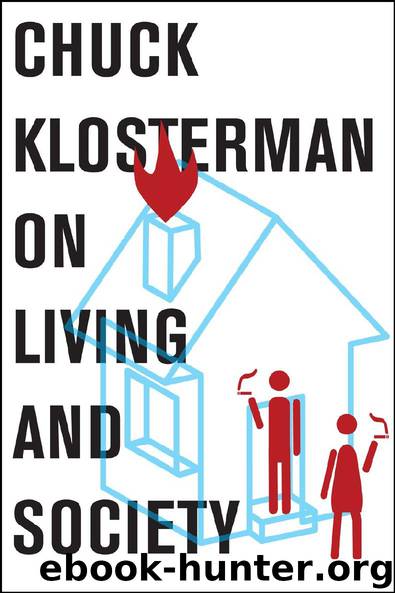Chuck Klosterman on Living and Society by Chuck Klosterman

Author:Chuck Klosterman
Language: eng
Format: epub
Publisher: Scribner
Published: 2009-07-15T00:00:00+00:00
Q: You are offered a Brain Pill. If you swallow this pill, you will become 10 percent more intelligent than you currently are; you will be more adept at reading comprehension, logic, and critical thinking. However, to all other people you know (and to all future people you meet), you will seem 20 percent less intelligent. In other words, you will immediately become smarter, but the rest of the world will perceive you as dumber (and there is no way you can ever alter the universality of that perception).
Do you take this pill?
NOT GUILTY
Every so often, I look at the condition of the world and I suspect that the most widespread problem we have is the ever-growing sentiment of anti-intellectualism that seems to infiltrate everything, particularly politics (where intelligent candidates are attacked for being intelligent) and advertising (where everything is designed to convince smart people they’ll be happier once they agree to become dumb). However, this is something I’m wrong about; anti-intellectualism is a dangerous problem, but it’s not as annoying as pretend intellectualism, which inevitably manifests itself as antipopulism. Which is why I always want to blow up my brain whenever I hear people talking about “guilty pleasures.”
I am not sure if anyone actually invented the term “guilty pleasure,” since—in and of itself—it seems like a reasonable way to describe certain activities. For example, it is pleasurable to snort cocaine in public restrooms, and it always makes you feel guilty; as such, lavatory cocaine fits perfectly into this category. Drinking more than five glasses of vodka before (or during) work generally qualifies as a guilty pleasure. This is also true for having sex with people you barely know, having sex with people you actively hate, and/or having sex with people you barely know but whom your girlfriend used to live with during college (and will now subsequently hate). These are all guilty pleasures in a technical sense. However, almost no one who uses the term “guilty pleasure” is referring to situations like these; people who use the term “guilty pleasure” in casual conversation are often talking about why they like Patrick Swayze’s Road House. This drives me insane for two reasons: by labeling things like Patrick Swayze as guilty pleasures, it somehow dictates that (a) people should feel bad for liking things they sincerely enjoy, and (b) if these same people were not somehow coerced into watching Road House every time it comes on TBS, they’d just as likely be reading A Portrait of the Artist as a Young Man.
Both of these principles are wrong.
Though I could be wrong about this, I think Entertainment Weekly semi-accidentally started all this way back in the twentieth century with a “Guilty Pleasures” issue. At least initially, this was a charming idea. It was mainly a way for them to write about things that would normally be nonsensical to cover, and it dovetailed nicely with the primary cultural obsession of all people born between the years of 1968 and 1980 (i.e., comedic nostalgia for the extremely recent past).
Download
This site does not store any files on its server. We only index and link to content provided by other sites. Please contact the content providers to delete copyright contents if any and email us, we'll remove relevant links or contents immediately.
Cecilia; Or, Memoirs of an Heiress — Volume 1 by Fanny Burney(31438)
Cecilia; Or, Memoirs of an Heiress — Volume 3 by Fanny Burney(31030)
Cecilia; Or, Memoirs of an Heiress — Volume 2 by Fanny Burney(30978)
The Great Music City by Andrea Baker(22608)
We're Going to Need More Wine by Gabrielle Union(18119)
Bombshells: Glamour Girls of a Lifetime by Sullivan Steve(13152)
Pimp by Iceberg Slim(12984)
All the Missing Girls by Megan Miranda(12825)
Fifty Shades Freed by E L James(12487)
Talking to Strangers by Malcolm Gladwell(11969)
Norse Mythology by Gaiman Neil(11952)
Crazy Rich Asians by Kevin Kwan(8405)
Mindhunter: Inside the FBI's Elite Serial Crime Unit by John E. Douglas & Mark Olshaker(7885)
The Lost Art of Listening by Michael P. Nichols(6523)
Enlightenment Now: The Case for Reason, Science, Humanism, and Progress by Steven Pinker(6442)
Bad Blood by John Carreyrou(5810)
The Four Agreements by Don Miguel Ruiz(5568)
Weapons of Math Destruction by Cathy O'Neil(5091)
We Need to Talk by Celeste Headlee(4915)
